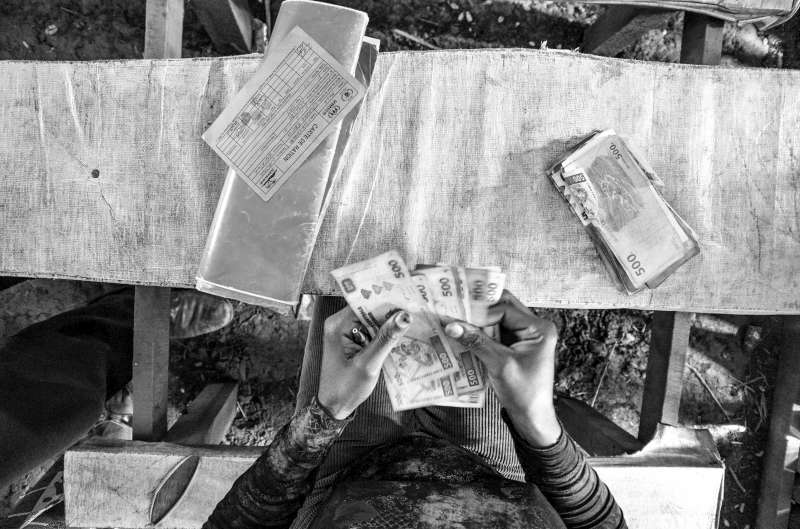
A refugee from Central African Republic checks the money she received for four people during a cash grant distribution in Mole camp, northern Democratic Republic of the Congo.
MOLE REFUGEE CAMP, Democratic Republic of the Congo, October 3 (UNHCR) – The market in Mole refugee camp was buzzing on a recent Saturday morning, with stalls selling everything from fish, goat meat, cassava and vegetables to clothes, cosmetics, household items and electronic equipment.
Just two months earlier, the place had been half empty. That all changed when the World Food Programme (WFP) decided to end food distributions and introduced cash grants for the 13,000 refugees from Central African Republic, transforming life in Mole in northern Democratic Republic of the Congo (DRC).
“Food distribution was always chaotic; some food was missing. Now [with the grants], everyone receives their cash without any problem,” noted Patrick N’Gocko, a 25-year-old refugee representative. The funds are distributed by UNHCR.
And these grants have helped to create new economies as well as making people self-sufficient. For example, many refugees have been busy cultivating extra crops around the camp for sale in the market, while others have become traders, bringing in goods from other parts of Equateur province to sell to their cashed-up compatriots.
N’Gocko said 50-60 per cent of the shops in the camp were funded through the cash grants, and the increasing trade traffic had begun drawing locals to the market. “The village of Mole is moving. Villagers come to the camp and sell their products,” he said, adding: “Goods are sold very quickly because the refugees have money.”
Many of the refugees questioned by UNHCR said that since WFP introduced the cash grants three months ago in the camp, they can eat and buy what they like and vary their diet. “They are happy. Cows are killed in the camp,” said N’Gocko, in an isolated region where beef is regarded as a bit of a luxury.
“The grant allows us to vary our meals a little. Now I eat what I want,” added Edwige Kpomako, another refugee leader. She likes fish, which she buys from villagers in Mole, which is located near the Oubangui River.
Many of the refugees, like 52-year-old Antoinette Vougbou, say that the cash grant allows them to pay for their own needs and use what’s left to run a small business, helping to make them self-sufficient. The mother of two makes and sells fish with chickwangue, a starchy sweet cassava dish. “I’ve been running my business for a month,” she said with a smile.
However, the cash grants also present challenges, including an increase in the price of food and other items at the market. Another challenge is that a smaller proportion is being used to buy food. When refugees receive cash grants, some buy items they could not previously afford, like clothes, household items or leisure goods.
N’Gocko claimed there was a link between the purchase of non-food items and rising malnutrition since the food distributions were ended and cash grants handed out. “Before when food was distributed, there was automatically something to eat,” he said, while calling for the introduction of a blanket supplementary nutrition programme for pregnant and lactating women and children aged up to five years.
Alcohol is another concern; people – especially men – with money are more likely to buy it. UNHCR and some other organizations carefully monitor the situation as alcoholism can affect family and the safety of those living in the camps.
But the biggest challenge to the programme is a lack of funding, which could force the WFP to cut its food and cash distributions in the Democratic Republic of the Congo. If it does not receive fresh funding by the end of October, WFP says it will have to suspend cash grants with immediate effect. That could leave the refugees without food or cash.
“While we have seen significant improvements in the life of the Central African Republic refugees since the introduction of cash grants to replace food distribution, their suspension could have a very negative impact,” said Stefano Severe, UNHCR’s Kinshasa-based regional representative.
“Therefore, we renew our call to donors to continue to support the provision of cash grants and assistance to Central African Republic refugees despite increased humanitarian needs worldwide,” he added.
By Céline Schmitt in Mole Refugee Camp, Democratic Republic of the Congo


